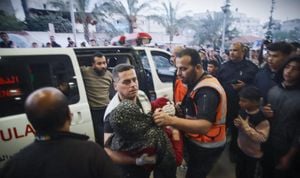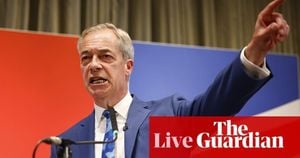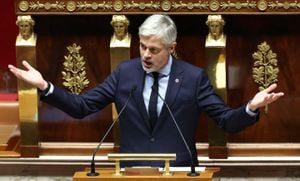On the morning of December 4th, chaos erupted outside the Golden Temple, one of Sikhism's holiest sites, as Sukhbir Singh Badal, leader of the Shiromani Akali Dal (SAD), survived an assassination attempt. Badal, who was performing penance as part of his religious sentence, was targeted when a gunman opened fire at him. Remarkably, the shot missed, hitting only the temple wall.
This audacious attack unfolded around 9:30 am, during Badal's guard duty outside the temple. Dressed as a 'sewadar', or volunteer, and seated due to his fractured leg, he was holding a ceremonial spear and had on display the plaque signifying his confession of mistakes committed during his party's governance from 2007 to 2017. The attack was witnessed by onlookers and media personnel, whose coverage captured the dramatic moment when chaos ensued as people fled for safety.
The shooter has been identified as Narain Singh Chaura, known for his past affiliations with Khalistani movements. Eyewitness accounts describe how Chaura approached Badal, pulled out his weapon, and fired. Thankfully, members of the audience quickly intervened, overpowering him before he could take another shot.
Badal's swift security response contributed to preventing what could have been a tragic assassination. Following the incident, police arrested Chaura and initiated an investigation to discern his motives. Sherlucking to the Punjab Police's accounts, Chaura had previously been flagged for potential threats against political figures.
Punjab Chief Minister Bhagwant Mann praised law enforcement for their rapid response, stating, "The alertness of Punjab police has thwarted what could have been a catastrophic event. I strongly condemn the attack on Sukhbir Singh Badal." Mann emphasized the need for comprehensive security assessments for public figures following the alarming incident.
Akal Takht Jathedar Giani Raghbir Singh also voiced his disapproval, labeling the attack as not just targeting Badal but as an affront to the services of all devoted volunteers who serve the Sikh community. He urged the government to initiate a thorough investigation.
Political reactions have poured in from various quarters. Congress leader and Opposition leader Partap Singh Bajwa condemned the shooting, labeling it as "deeply unfortunate and unequivocally condemnable". His remarks reflect broader concerns over the deteriorated security situation within Punjab, urging for calm and responsible discourse among political entities.
The Shiromani Gurdwara Parbandhak Committee (SGPC) president, Harjinder Singh Dhami, echoed these sentiments, criticizing the attack targeting the very sanctity of the Golden Temple. He remarked, "This is not merely violence against Sukhbir Singh Badal; it is violence against our sacred space."
Meanwhile, senior BJP leader Captain Amarinder Singh expressed relief at Badal's narrow escape and highlighted the necessity for accountability among security forces—calling this incident another indication of Punjab’s deteriorated law and order situation.
Badal's involvement with the Golden Temple stems from his recent religious penance, which he accepted after being declared "Tankhaiya" by the Akal Takht—an internal mechanism of justice within the Sikh religious framework—due to alleged past misdeeds during his leadership tenure.
This isn't the first time political turmoil has surrounded the Golden Temple, which has been historically notorious for violence. Back in 1984, Indian military action against perceived insurgents at the temple, labelled Operation Blue Star, resulted in severe loss of life and created lasting political scars within the community.
Following this latest incident, security has been heightened for those public figures attending events at religious sites, particularly those like the Golden Temple, which carry significant emotional and cultural weight.
While investigations are underway to comprehend the full scope and background of the shooter and his intention, the people of Punjab, along with various political leaders, are longing for stability and peace, ensuring such incidents are not repeated. "We must unite to preserve the sanctity of our heritage and the safety of our leaders," said political activist Gurpartap Singh Wadala as he expressed concern over potential rising tensions within the community.
The attack served as another jarring reminder of the underlying tensions and volatile atmosphere permeate Punjab’s political and social fabric. With reminders of the past still fresh, leaders across the spectrum are committed to fostering dialogue and security, avoiding the shadows of historical violence.
While the investigation results will shed light on the motive behind Chaura's actions, the incident undoubtedly raises broader questions about the safety of political leaders and the current state of communal harmony within Punjab. Will this serve as the call to action needed to strengthen community relations, or is it likely to deepen existing fissures? Only time will tell as the people of Punjab wait for clarity and the promise of peace.



